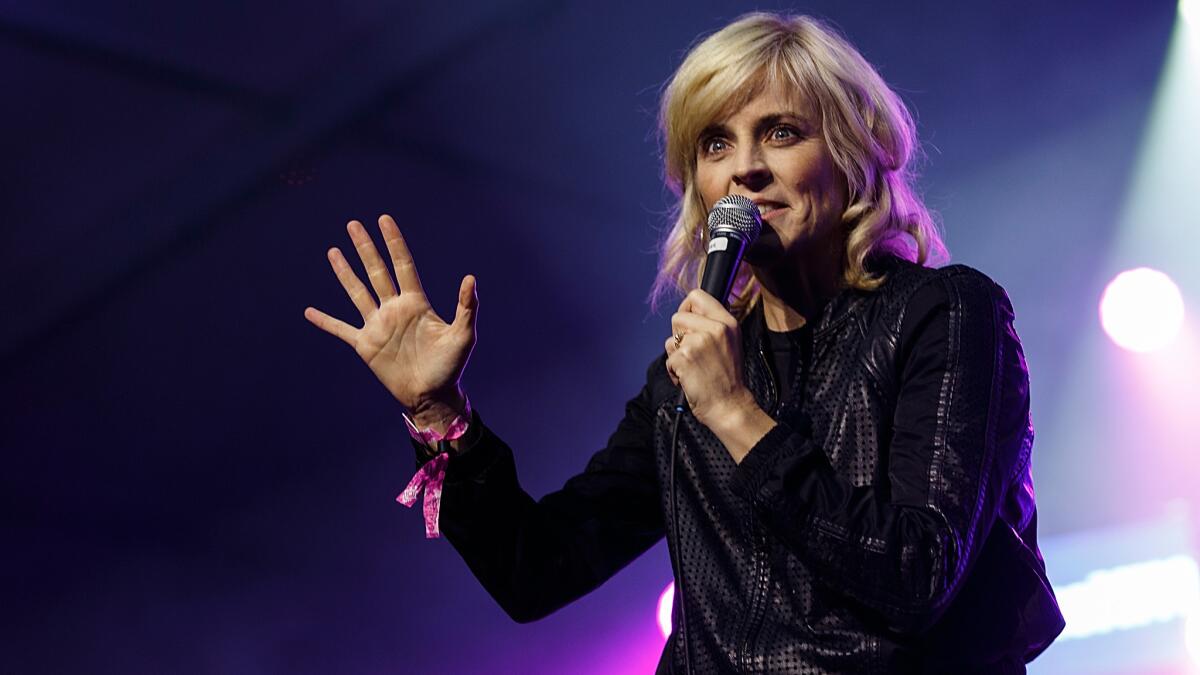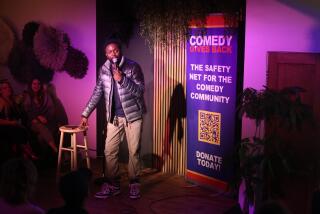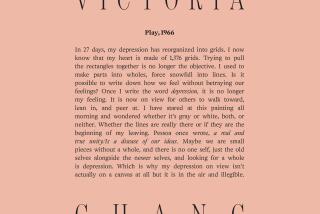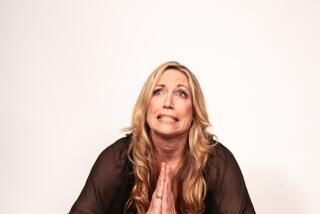Maria Bamford’s favorite self-help books
Maria Bamford, the iconoclastic comedian behind the Netflix original sitcom “Lady Dynamite,” a slew of stand-up comedy specials and the cult-favorite Web series “The Maria Bamford Show,” often taps her struggles with mental illness for her routines. The results are both outrageously funny and unexpectedly poignant: deeply personal work that attacks the stigma of mental illness by its sheer openness, specificity and sense of humor.
Perhaps unsurprisingly, Bamford is a fan of self-help books, a genre often overlooked or even stigmatized in its own right, despite its popularity. Self-help books make the occasional cameo in Bamford’s work, as in one particular routine, when she asks of a happy couple “So, you never had any issues you had to work through with, like, a friggin’ workbook?”
“It’s definitely a hobby,” she says of her self-help reading habits, and then describes the appeal of self-help books as only Maria Bamford can. “I call it emotional Sudoku,” she says, “It’s like Dungeons and Dragons, but for Oprah.”
In September, Bamford digitally released a third album with Comedy Central Records, “20%,” which was recorded at UCB Franklin. I spoke to her over the phone about six self-help books that she personally recommends. Our conversation has been edited for length and clarity.
“Unstuck: A Supportive and Practical Guide to Working Through Writer’s Block” by Jane Anne Staw (St. Martin’s Griffin, 2003)
This book is awesome. It’s step by step. I’ve thought about calling the writer myself, she just sounds so great. (She works with individuals to help get them unblocked.) One thing I do with books that people would probably hate, I cut things out of them that inspire me, so my copy of this book is all cut up. I put the pieces in my calendar or my journal. For example, “A Supportive and Practical Guide to Working Through Writer’s Block,” which is just the subtitle of the book, I cut that out because I felt that’s what I need. I have a couple of ladies who I check in with via email, updating them on what I’m writing every day — my two pages a day. This book encourages thinking small. “Making your writing world safer” is one of the topics. It was very helpful. I may have searched “Writers Block” on Amazon and this book came up. I apologize to small, independent bookstores in my neighborhood.
“Personal Finance for Dummies” by Eric Tyson (For Dummies, 2015)
When I was finally able to save a little extra money and wanted to know what to do — how to prepare for retirement, how to learn about investments — I thought I’d pick this up. [Before that] I’d watched a lot of Suze Orman, which had terrified me: “You have $2.5 million. You cannot retire until the age of 75.” I’d see that and think “Oh my God!” This book is airtight and has a lovely way of writing. The first chapter especially is just really hopeful! It’s like, “calm down.” It’s great.
“Get a Life: You Don’t Need a Million to Retire Well” by Ralph Warner (NOLO, 2005)
[While] “Personal Finance for Dummies” is definitely an education in financial terms, “Get a Life: You Don’t Need a Million to Retire Well” is about quality of life. This writer interviewed hundreds of people and found that the ones who had the most personal connections — who are reaching out and creating meaning in their lives, who have a plan and a vision for it — are happiest. There’s a whole chapter on friendship. Make younger friends, make friends outside of work, and get involved in your community. I’m much more work oriented. The first part of my life was all about trying to achieve things, and then realizing that if you don’t have anyone to enjoy it with, who cares? A lot of people already know that inherently, but I certainly didn’t. My husband and I have been having people over for dinner a lot more. We go to an open mike in our neighborhood and see comedy there. We’re trying to connect. “Get a Life” has interviews with real people. It’s from NOLO press, a wonderful publisher in Northern California. They’re all about doing things yourself, including self-help law.

“The Relationship Cure: A 5 Step Guide to Strengthening Your Marriage, Family, and Friendships” by John Gottman (Harmony, 2002)
The Gottman books are about the science of bid response. This is hilarious; my husband and I are driving to the airport right now, and I hope I’m giving him accurate directions and “responding to his bids.” I hadn’t been putting [that practice] towards work, friendship, or my community. I’d think, “Oh, yeah, of course I’d love to be involved in the neighborhood,” but how many times have I said no to community-oriented things? Oh, almost every time. My husband and I were reading [“The Relationship Cure”] out loud to each other. Sometimes self-help books are like science fiction. They take place in a land where everyone says their part in the conversation, exactly as it’s written, like in the Gottman book.
“Swimming With Elephants” by Sarah Seidelmann (Red Wheel Press, coming in 2017)
This is my sister’s latest book. It’s her story — a memoir about reinvention. She was a pathologist for about 15 years, lived in Duluth, Minn., bought a giant house and had four children… She was kind of a super-doer. She slowly started going part time and eventually transformed herself into a life coach and a practitioner of shamanic healing. It’s very brave. In L.A. it’s OK to do something like that, but where she lives it’s a risky choice. She has two other books, “Born to Freak” and “What the Walrus Knows,” both self-published. For this one she got a book deal. She’s really funny. In one of my favorite scenes there’s the chaos of their home — a giant kitchen remodel — and she’s lying in her bathroom thinking, “What am I doing? What’s going on?” She went to Thailand and swam with elephants. That’s where the title comes from. She used to be a very logical person and now she has a spiritual guide. It’s very inspiring to me.
“It’s Never Too Late to Begin Again: Discovering Creativity and Meaning in Midlife and Beyond” by Julia Cameron (TarcherPerigee, 2016)
This is on my reading list. I’ve read [Julia Cameron’s] “The Artist’s Way” so many times that the words have lost all meaning to me. I’m like, “I know, I know. I understand! I’m doing my pages. I’m doing my artist dates.” So I just want to read it again, but with different stories. This book is co-written by her business manager Emma Lively. It’s about memoir writing too, which interests me. [In addition to the Artist’s Way exercises] this book adds “solo walks” to “quell anxiety and clear the mind.” I’m excited to have some new ideas that are in [Cameron’s] same style, because I love her writing and point of view. If I were to begin again, I think I’d like to be an extrovert.
French is a writer in Los Angeles.
More to Read
Sign up for our Book Club newsletter
Get the latest news, events and more from the Los Angeles Times Book Club, and help us get L.A. reading and talking.
You may occasionally receive promotional content from the Los Angeles Times.







